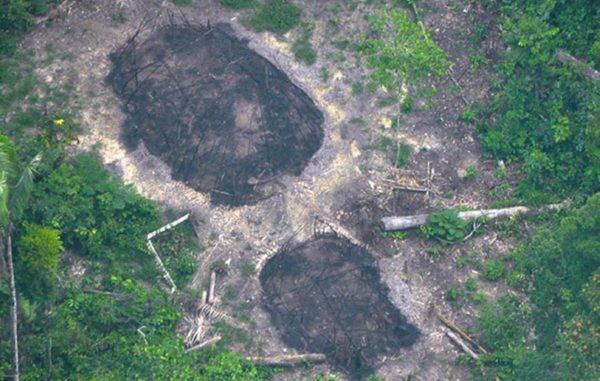
by Deep Green Resistance News Service | Sep 9, 2017 | Colonialism & Conquest
Featured image: Evidence of an attack? Burnt communal houses of uncontacted Indians, seen in December 2016, could be signs of another massacre in the Uncontacted Frontier. © FUNAI
by Survival International
Public prosecutors in Brazil have opened an investigation after reports that illegal gold miners in a remote Amazon river have massacred “more than ten” members of an uncontacted tribe. If confirmed, this means up to a fifth of the entire tribe have been wiped out.
Two miners have been arrested.
The killings allegedly took place last month along the River Jandiatuba in western Brazil, but the news only emerged after the miners started boasting about the killings, and showing off “trophies” in the nearest town.
Agents from Brazil’s indigenous affairs agency, FUNAI, confirmed details of the attack to Survival International. Women and children are believed to be among the dead. FUNAI and the public prosecutor’s office are currently investigating.
The area is known as the Uncontacted Frontier, as it contains more uncontacted tribes than anywhere else on Earth.
Several government teams who had been protecting uncontacted indigenous territories have recently had their funding slashed by the Brazilian government, and have had to close down.
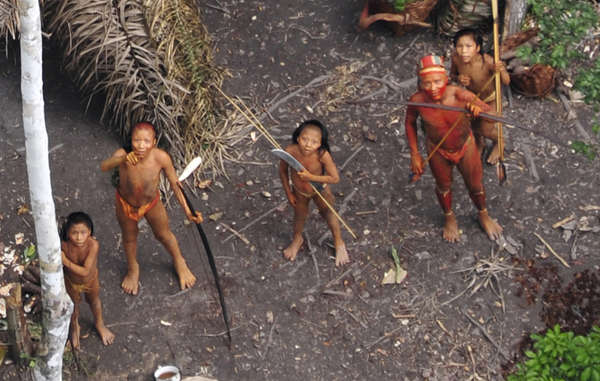
Uncontacted Indians in the Brazilian Amazon, filmed from the air in 2010. © G.Miranda/FUNAI/Survival
President Temer’s government is fiercely anti-Indian, and has close ties to the country’s powerful and anti-indigenous agribusiness lobby.
The territories of two other vulnerable uncontacted tribes – the Kawahiva and Piripkura – have also reportedly been invaded. Both are surrounded by hundreds of ranchers and land invaders.
Uncontacted tribes are the most vulnerable peoples on the planet. However, when their rights are respected, they continue to thrive.
All uncontacted tribal peoples face catastrophe unless their land is protected. Survival International is doing everything it can to secure their land for them, and to give them the chance to determine their own futures.
Survival’s Director Stephen Corry said: “If these reports are confirmed, President Temer and his government bear a heavy responsibility for this genocidal attack. The slashing of FUNAI’s funds has left dozens of uncontacted tribes defenseless against thousands of invaders – miners, ranchers and loggers – who are desperate to steal and ransack their lands. All these tribes should have had their lands properly recognized and protected years ago – the government’s open support for those who want to open up indigenous territories is utterly shameful, and is setting indigenous rights in Brazil back decades.”
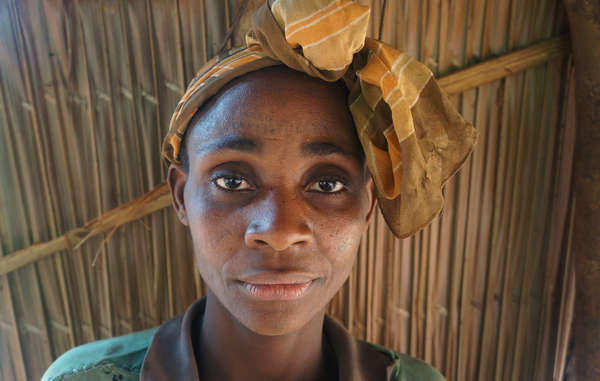
by Deep Green Resistance News Service | Sep 6, 2017 | Lobbying
Featured image: This Baka woman and her husband are among many tribal people in Cameroon who have been beaten by WWF-funded wildlife guards. They were attacked and had their belongings taken from them while they were collecting wild mangoes. © Survival International
by Survival International
The landmark mediation talks between Survival and the World Wildlife Fund (WWF) over breaches of Organization for Economic Co-Operation and Development (OECD) guidelines for multinational corporations have broken down over the issue of tribal peoples’ consent.
Survival had asked WWF to agree to secure the Baka “Pygmies’” consent for how the conservation zones on their lands in Cameroon were managed in the future, in line with the organization’s own indigenous peoples policy.
WWF refused, at which point Survival decided there was no purpose continuing the talks.
Survival lodged the complaint in 2016, citing the creation of conservation zones on Baka land without their consent, and WWF’s repeated failure to take action over serious human rights abuses by wildlife guards it trains and equips.
It is the first time a conservation organization has been the subject of a complaint under the OECD guidelines. The resulting mediation was held in Switzerland, where WWF is headquartered.
WWF has been instrumental in the creation of several national parks and other protected areas in Cameroon on the land of the Baka and other rainforest tribes. Its own policy states that any such projects must have the free, prior and informed consent of those affected.
A Baka man told Survival in 2016: “[The anti-poaching squad] beat the children as well as an elderly woman with machetes. My daughter is still unwell. They made her crouch down and they beat her everywhere – on her back, on her bottom, everywhere, with a machete.”
Another man said: “They told me to carry my father on my back. I walked, they beat me, they beat my father. For three hours. Every time I cried they would beat me, until I fainted and fell to the ground.”
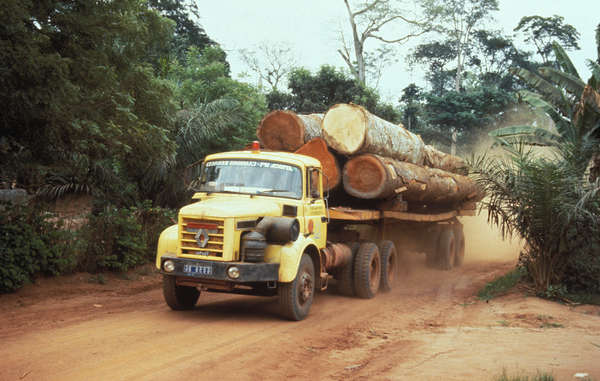
Conservation has been used as a justification for forcibly denying Baka access to their land, but the destruction of the rainforest by logging companies – some of whom are WWF partners – has continued. © Margaret Wilson/Survival
Background briefing
– Survival first raised its concerns about WWF’s projects on Baka land in 1991. Since then, Baka and other local people have repeatedly testified to arrest and beatings, torture and even death at the hands of WWF-funded wildlife guards.
– The OECD is the Organization for Economic Co-Operation and Development. It publishes guidelines on corporate responsibility for multinationals, and provides a complaint mechanism where the guidelines have been violated.
– The complaint was lodged with the Swiss national contact point for the OECD, as WWF has its international headquarters in Switzerland. Talks took place in the Swiss capital, Bern, between representatives of WWF and Survival.
– The principle of Free, Prior and Informed Consent (FPIC) is the bedrock of international law on indigenous peoples’ rights. It has significant implications for big conservation organizations, which often operate on tribal peoples’ land without having secured their consent.
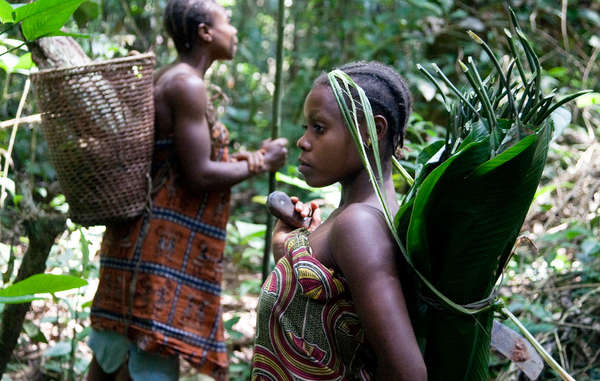
Tribes like the Baka have lived by hunting and gathering in the rainforests of central Africa for generations, but their lives are under threat. © Selcen Kucukustel/Atlas
Tribal peoples like the Baka have been dependent on and managed their environments for millennia. Contrary to popular belief, their lands are not wilderness. Evidence proves that tribal peoples are better at looking after their environment than anyone else. Despite this, WWF has alienated them from its conservation efforts in the Congo Basin.
The Baka, like many tribal peoples across Africa, are accused of “poaching” because they hunt to feed their families. They are denied access to large parts of their ancestral land for hunting, gathering, and sacred rituals. Many are forced to live in makeshift encampments on roadsides where health standards are very poor and alcoholism is rife.
Meanwhile, WWF has partnered with logging corporations such as Rougier, although these companies do not have the Baka’s consent to log the forest, and the logging is unsustainable.
Survival’s Director Stephen Corry said: “The outcome of these talks is dismaying but not really surprising. Conservation organizations are supposed to ensure that the ‘free, prior and informed consent’ of those whose lands they want to control has been obtained. It’s been WWF’s official policy for the last twenty years.
“But such consent is never obtained in practice, and WWF would not commit to securing it for their work in the future.
“It’s now clear that WWF has no intention of seeking, leave alone securing, the proper consent of those whose lands it colludes with governments in stealing. We’ll have to try other ways to get WWF to abide by the law, and its own policy.”
Watch: Baka father speaks out against horrific abuse
“Pygmy” is an umbrella term commonly used to refer to the hunter-gatherer peoples of the Congo Basin and elsewhere in Central Africa. The word is considered pejorative and avoided by some tribespeople, but used by others as a convenient and easily recognized way of describing themselves.
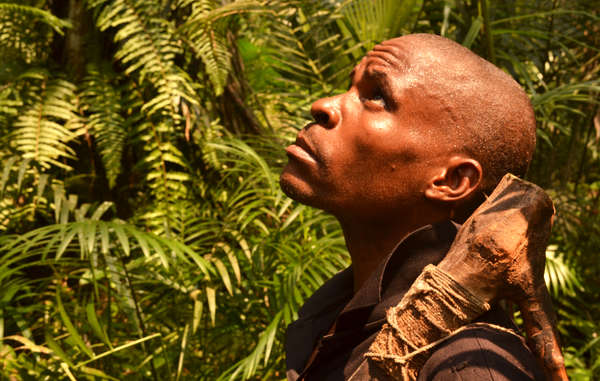
by Deep Green Resistance News Service | Jun 30, 2017 | Colonialism & Conquest
Featured image: Vast swathes of the Bayaka’s ancestral homelands in the Republic of Congo have been taken over without their consent by loggers and big conservation NGOs. © Lambert Coleman
by Survival International
An investigation by Survival International has revealed that the Wildlife Conservation Society (WCS), the parent organization of New York’s Bronx Zoo, is funding the abuse and eviction of Bayaka “Pygmies” and other rainforest tribes in the Republic of Congo.
WCS manages and helped create a national park on Bayaka land without the tribe’s consent, and has formed a partnership with two logging companies working on their land. WCS is also funding anti-poaching squads which prevent the Bayaka from entering their ancestral lands, and Survival International has documented dozens of instances of harassment, beatings and even torture.
The Bayaka are frequently accused of “poaching” when they they hunt to feed their families. Tribal people have complained that this diverts action away from tackling the true poachers – criminals conspiring with corrupt officials.
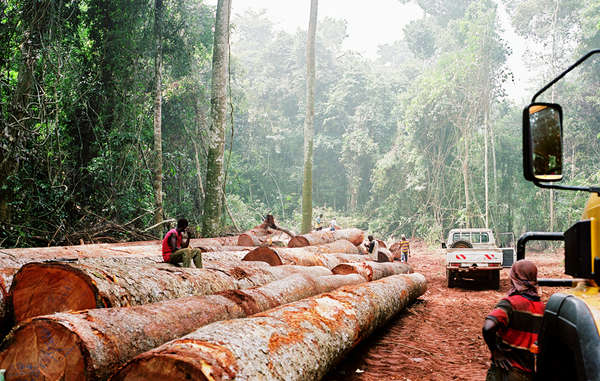
Big conservation has failed to prevent widespread logging on tribal land, and has actively contributed to serious human rights abuses. © Kate Eshelby /Survival
Victims have included children, the elderly and disabled people. In 2012, for example, a severely disabled tribal man was assaulted by guards. In May 2016, one man was hospitalized after he and four others were brutally beaten by guards. Forest camps are frequently destroyed, and tribal people are attacked and tortured for accessing land which they have been dependent on and managed for generations.
A Bayaka man said: “If you go into the park they will get you and take you to prison. Even outside the park they say ‘We’re going to kill you. Get out, get out, get out.’”
Logging in the region continues at unsustainable levels, according to reports by independent researchers and advocacy groups, including Greenpeace. Many observers including the United Nations and Congolese organization l’Observatoire congolais des droits de l’homme, have been warning about the consequences of ecoguard abuse since at least 2004, but no effective action has been taken.
In 2005, a Bayaka man reported that: “We met another white man [from WCS] who came to tell us to stop hunting and that the wildlife guards would make sure we did. Now we are afraid to go far in the forest in case the wildlife guards catch us.”
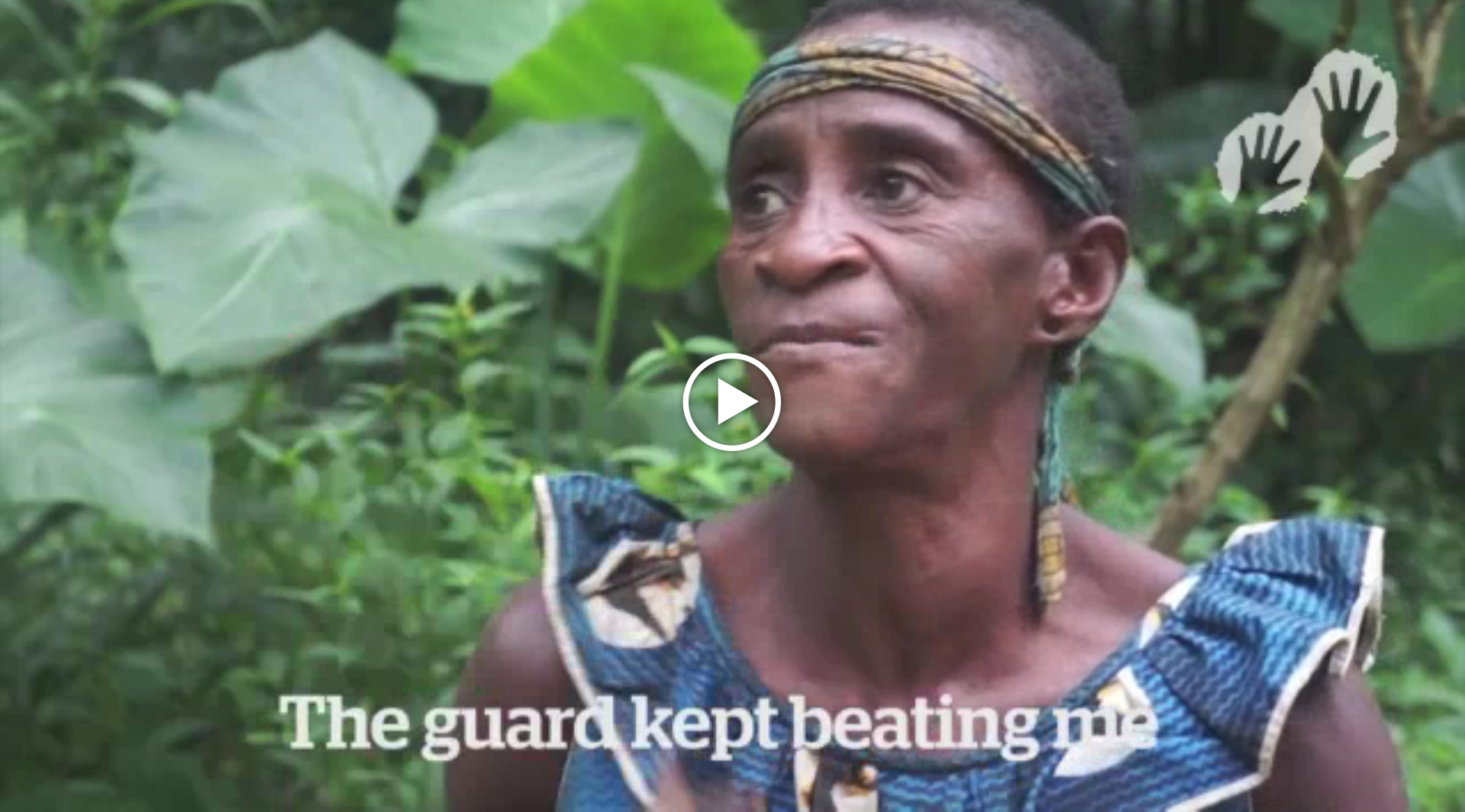
Watch: Apfela describes how wildlife guards, supported by the Wildlife Conservation Society, brutally attacked her.
Survival’s Director Stephen Corry said: “Conservation in the Congo Basin is based on land theft. National parks are created on indigenous peoples’ territories without their consent: It’s land-grabbing (with a “green” label) and the big conservation organizations, like WCS, are guilty of supporting it. Survival International is doing all it can to stop this “green colonialism.” It’s time for conservationists to respect land rights, stop stealing tribal peoples’ ancestral homelands, and obtain proper permission for every project they seek to carry out on tribal land.”
Background briefing
-WCS is one of the world’s oldest conservation organizations, founded in 1895.
-WCS backed the creation of Nouabalé-Ndoki National Park in 1993 without the Bayaka’s consent. It manages the park to this day.
– The organization runs an annual “Teddy Roosevelt Award” for conservation. In 2017, the award generated controversy when it was presented to Gabon’s president Ali Bongo, who has been widely criticized for his government’s record of human rights abuse. According to some reports, Bongo donated $3.5m in exchange for the award.
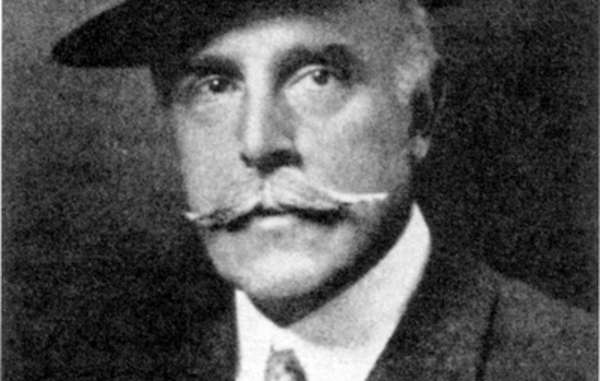
Madison Grant, notorious eugenicist and founder of the organization which would become the Wildlife Conservation Society (WCS). © Wikimedia Commons
– The Bronx Zoo and the conservation organization that would become WCS were founded by eugenicist author Madison Grant. Infamously, they brought a “Pygmy” man, Ota Benga, to the zoo in the early 1900s. He was exhibited to the public, and encouraged to live in the zoo’s monkey house. He committed suicide in 1916.
– Bayaka people in the Central African Republic and Republic of Congo wrote open letters to WCS and its funders in 2016.
– The abuse of Bayaka by WCS-supported squads has been documented for at least 18 years, but the organization has failed to take effective action to stop it.
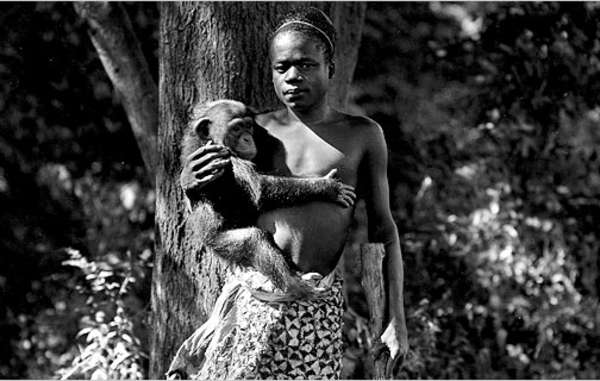
Ota Benga, a Congolese ‘Pygmy’ man who was transported to the US and exhibited in zoos, before committing suicide in 1916. © Wikimedia
WCS is not the only multinational NGO implicated in the abuse of tribal peoples. Many of the big conservation organizations are partnering with industry and tourism and destroying the environment’s best allies.
It’s a con. And it’s harming conservation. Survival International is leading the fight against these abuses, for tribes, for nature, for all humanity.
“Pygmy” is an umbrella term commonly used to refer to the hunter-gatherer peoples of the Congo Basin and elsewhere in Central Africa. The word is considered pejorative and avoided by some tribespeople, but used by others as a convenient and easily recognized way of describing themselves.
Some names have been changed to protect tribal people’s identity.
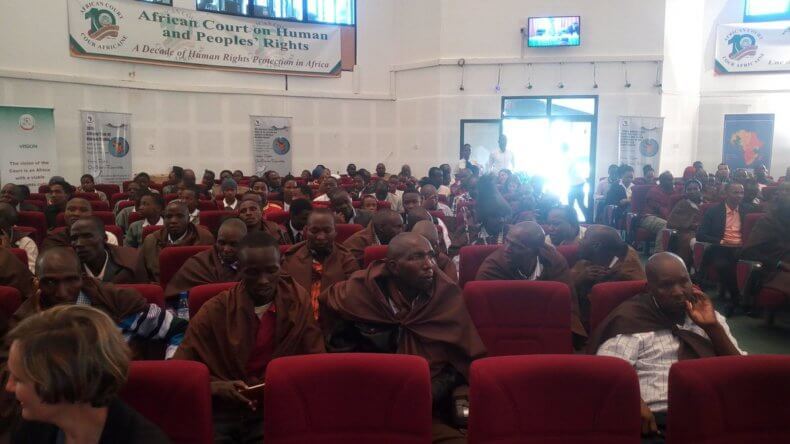
by Deep Green Resistance News Service | Jun 2, 2017 | Lobbying
Featured image: The Ogiek preparing to receive the African Court’s landmark decision after awaiting close to a decade. Photo: Andrew Songa on twitter @drewfremen
by Venatrix Fulmen / ECOTERRA Intl. via Intercontinental Cry
The
African Court on Human and Peoples Rights, at its 45
th session on May 26, 2017 in Arusha, Tanzania, delivered a long-awaited and unanimous judgment against the Kenya government in a case brought before it by the Ogiek Indigenous Peoples.
The African Commission on Human and Peoples Rights had filed the case after the applicant proved consistent violations and the denial of the human and land rights of the Ogiek by the Republic of Kenya.
In November 2009, when the Kenyan Forest Service (KFS) delivered a potentially fatal blow against the Ogiek with the designation of an eviction order in October 2009 against the Ogiek and anyone else within the Mau Forest Complex–the ancestral homeland of the Ogiek–within 30 days, the African Court had issued an order to suspend the implementation of the eviction notice.
In March 2013, the African Court issued additional provisional measures requiring the Kenyan Government to stop any land transactions in the Mau Forest and refrain from taking any action that would harm the case, until a decision had been reached. This order, however, has never been respected by the Kenyan state.
After dismissing the numerous objections of the government of Kenya, the African Court delivered in Arusha a comprehensive judgement and a very clear ruling, read out over almost 2 hours by Hon. Justice Agustino Ramadani, the former President of the African Court.
The court found that the government of the Republic of Kenya illegally evicted members of the Ogiek community from the Mau Forest and has continuously violated the rights of the Ogiek under Articles 1, 2, 8, 14, 17 (2/3), 21 and 22 of the African Charter on Peoples and Human Rights.
The Republic of Kenya given 6 months to implement required remedies
Concerning the demand for reparations and compensation, the Ogiek have 90 days to file an application and the Kenya state has 90 days to respond to the demands. After this period, the African Court will rule on the reparations to be awarded to the Ogiek community and its victims of abusive state power.
The ruling has been widely welcomed as a fair and just decision by the Ogiek and ECOTERRA Intl., an organization that has stood by the Ogiek since 1986, as well as other important supporters including Friends of Peoples close to Nature (fPcN-interCultural), Minority Rights International and CEMIRIDE.
This article was originally published by ECOTERRA Intl. It has been edited for Intercontinental Cry under a Creative Commons Non-Commercial Share-Alike License.
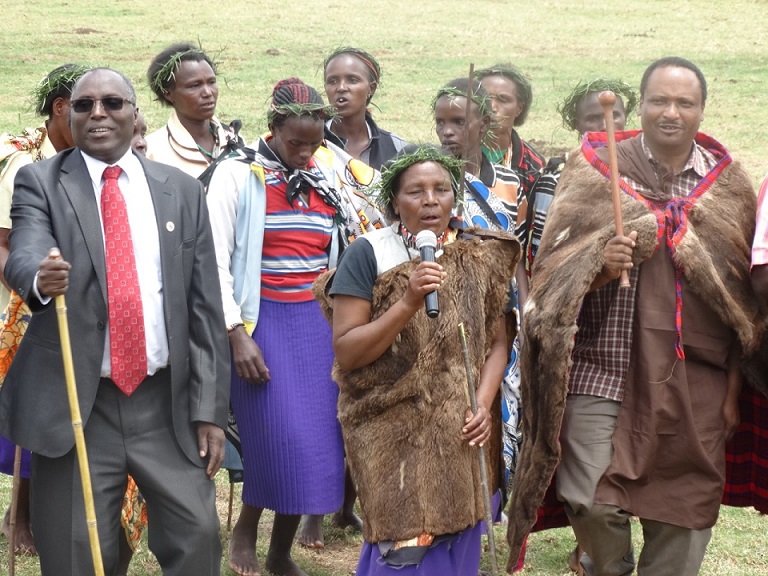
by Deep Green Resistance News Service | May 23, 2017 | Lobbying
by Minority Rights Group International
The African Court on Human and Peoples Rights, at its 45th session on 26 May 2017 in Arusha, will deliver a long-awaited judgment on a case brought before it, by the Ogiek indigenous peoples against the Kenyan government, for consistent violations and denial of their land rights.
‘This case is of fundamental importance for indigenous peoples in Africa, and particularly in the context of the continent-wide conflicts we are seeing between communities, sparked by pressures over land and resources,‘ says Lucy Claridge, Minority Rights Group International’s (MRG) Legal Director. ‘Ultimately the Court will be ruling on the crucial role of indigenous peoples in the conservation of land and natural resources, and consequently, the mitigation of climate change in a region currently ravaged by drought and famine.’
The Ogiek, 35, 000 of whom are the victims in this landmark case, live in the Mau Forest Complex in the Rift Valley of Kenya. They are one of the last remaining forest-dwelling communities and among the most marginalised indigenous peoples in Kenya. They allege eight violations of their rights to life, property, natural resources, development, religion and culture by the Kenyan government under the African Charter on Human and Peoples’ Rights, to which Kenya is a signatory.
This is the first time the African Court, in operation since 2006, will rule on an indigenous peoples’ rights case and is by far the largest ever case brought before the Court. It was originally lodged with the African Commission on Human and Peoples’ Rights, but was referred for the first time in history to the Court on the basis that it evinces serious and mass human rights violations. MRG, Ogiek Peoples’ Development Program (OPDP) and CEMIRIDE were the three original Complainants before the African Commission.
‘This judgment will be a huge milestone for the Ogiek community. We are optimistic that it will be positive, and crucially, that it will be respected by the Kenyan government, including implementation, so that Ogiek can feel complete and enjoy all the basic rights like every other Kenyan,’ says Daniel Kobei, Executive Director of OPDP.
The case was heard by the Court in November 2014. MRG delivered an oral intervention on behalf of the original Complainants, whilst two Ogiek community members and other expert witnesses gave testimony. MRG supported 25 Ogiek community members to attend the hearing, and supported a further 40 to view the hearing in Kenya via a live stream from the Court.
In March 2013, the African Court issued a provisional measures order requiring the Kenyan Government to stop land transactions in the Mau Forest and refrain from taking any action which would harm the case, until it had reached a decision. This order unfortunately has not been respected.
For decades the Ogiek have been routinely subjected to arbitrary forced evictions from their ancestral land in the Mau Forest by the government, without consultation or compensation. This has had a detrimental impact on the pursuit of their traditional lifestyle, religious and cultural life, access to natural resources and their very existence as an indigenous people. The Ogiek have a spiritual, emotional and economic attachment to the forest. They rely on it for food, shelter and identity.
Learn more
For more information please contact:
Lucy Claridge, MRG Legal Director (English, French)
M: +44 (0) 7866 741922
E: lucy.claridge@mrgmail.org
Kanyinke Sena, MRG Kenya Advocacy Officer (English, Swahili)
M: +254 725288402
E: kanyinke.sena@mrgmail.org
Daniel Kobei, Ogiek Peoples’ Development Program Executive Director (English, Swahili)
M: +254 722433757
T: +254 512213803
E: dkobei@yahoo.com / opdp@ogiekpeoples.org












